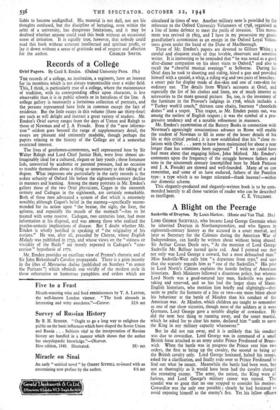Records of a College
Oriel Papers. By Cecil S. Emden. (Oxfor,d University Press. 15s.) THE records of a college, an institution, a regiment, have an interest for its members which is not always transmissible over a wider field. This, I think, is particularly true of a college, where the maintenance of tradition, with its corresponding effect upon character, is less observable than it is in public schools or in battalions of the line. A college gallery is necessarily a fortuitous collection of portraits, and the persons represented have little in common except the fact of residence. But the little essays in this volume (there are thirty-four) are such as will delight and instruct a great variety of readers. Mr. Emden's Oriel survey ranges from the days of Unton and Ralegh to those of Newman and of J. A Froude. Even if the " new informa- tion " seldom goes beyond the range of supplementary detail, the essays are pleasant and eminently wadable, though perhaps the papers relating to the history of the College are of a somewhat restricted interest.
The lives of gentlemen-commoners, well represented here by Sir Walter Ralegh and Lord Chief Justice Holt, were lives almost tin- imaginably ideal for a cultured, elegant or lazy youth ; these fortunate lads, unworried by academic or parental pressure, had no occasion to trouble themselves about a thing so unnecessary as the taking of a degree. What impresses one particularly in the early records is the sedate urbanity of Oxford life before the eighteenth-century decline in manners and learning. Among the Many portraits in Mr. Emden's gallery those of the two Oriel physicians, Cogan in the sixteenth century and Cadogan in the eighteenth, are certainly remarkable. Both of these men advocated a system of diet which is extremely sensible; although Cogan's belief in the nutmeg—specifically recom- mended for its action upon " the braine, the sight, the liver, the spleen; and especially the mouth of the stomach "—has to be treated with some reserve. Cadogan, two centuries later, had more information at his disposal, and was among those who realised the psycho-somatic implications of disease. But I doubt whether Mr. Emden is wholly justified in speaking of " the originality of his notions." He was, after all, preceded by Cheyne, whose English Malady was published in 1733, and whose views on the " siziness or viscidity of the fluids" are merely repeated in Cadogan's "con- cretion " hypothesis of 1771.
Mr. Emden provides an excellent view of Prynne's rhetoric and of Sir John Birkenhead's Cavalier propaganda. There is a grim jocosity in the jibes of Mercurius Aulius (published on Sundays " to annoy the Puritans ") which reminds one vividly of the modern style in those exhortative or humorous pamphlets and orders which are
circulated in times of war. Another military note is provided by the reference to the Oxford University Volunteers of 1798, organised as a line of home defence to meet the perils of invasion. This move- ment was revived in 1803, and I have in my possession my great- grandfather's commission as an ensign in the Oxford Loyal Volun- teers given under the hand of the Duke of Marlborough.
Three of Mr. Emden's papers are devoted to Gilbert White ; a careful and eloquent study of that lovable, observant and sensitive writer. It is interesting to be reminded that " he was noted as a good after-dinner companion on his short visits to Oxford," and also to recall the "cheerful musical evenings" at Selbome. During his Oriel days he took to shooting and riding, hired a gun and provided himself with a spaniel, a whip, a riding wig and two pairs of breeches : a smart pair for display made of doe-skin and one of ram-skin for ordinary use. The details from White's accounts at Oriel, and especially the list of his clothes and linen, are of much interest as accessories to the more general picture. So, too, is the inventory of the furniture in the Provost's lodgings in 1708, which includes a "Turkey work'd couch," thirteen cane chairs, fourteen " chocolade dishes " and a teapot. This teapot, as Mr. Emden points, out, was among the earliest of English teapots - it was the symbol of a pro- gressive tendency and of a notable refinement in manners. Mr. t mden's examination of the Buttery Books in connection with Newman's agonisingly conscientious = advance to Rome will enable the student of Newman to fill in some of the lesser details of his life at this critical period ; it is now established that his.' close re- lations with Oriel . . . seem to have been maintained for about a year longer than has sometimes been supposed." I wish we could have had more about that engaging fellow, John Mitford. Mr. Emden's comments upon the frequency of 'the struggle between fathers and sons in the nineteenth century (exeniplified here by Mark Pattison and J. A. Froude) are shrewd and well-founded. Many of us can remember, and' some of us have endured, fathers of the Pontifex type : a type which is no longer tolerated—thank heaven! within our domestic scheme.
This elegantly-produced and elegantly-written book is to be com- mended heartily to all those varieties of reader who can be described


































 Previous page
Previous page